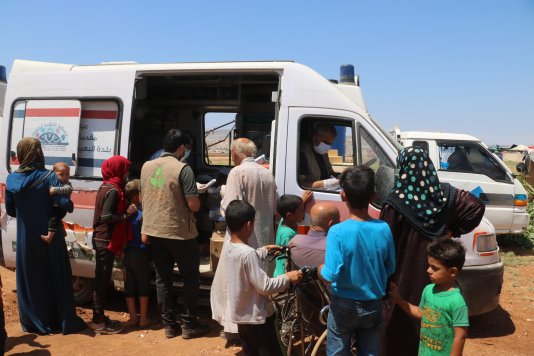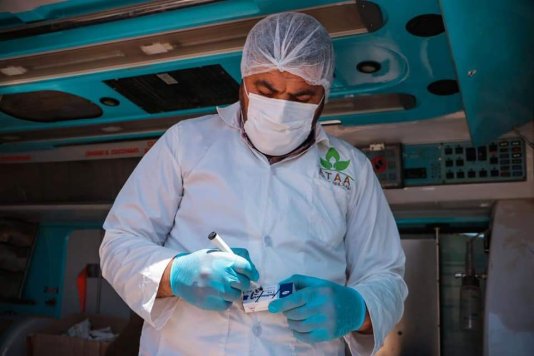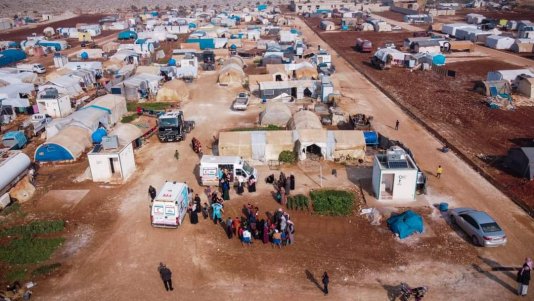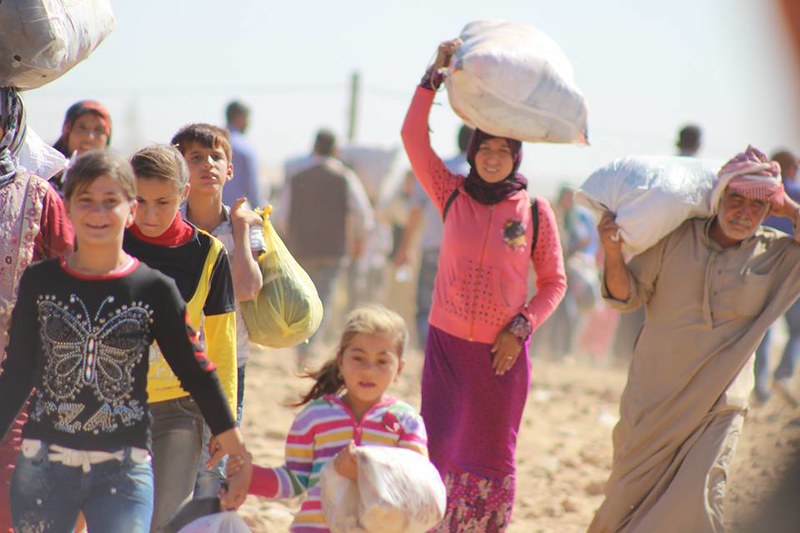- About
- Topics
- Story
- In-Depth
- Picks
- Opinion
- News
- Donate
- Signup for our newsletterOur Editors' Best Picks.Send
Read, Debate: Engage.
| November 08, 2022 | |
|---|---|
| topic: | Humanitarian Aid |
| tags: | #Syria, #Idlib, #humanitarian aid, #health, #displaced persons |
| located: | Syria |
| by: | Sonya Al Ali |
As Syria's civil war rages on, the health sector in the country's northwestern region continues to deteriorate and the the death toll from diseases steadily rises.
According to the World Health Organization, more than 12.2 million people in Syria are in urgent need of medical assistance, with half a million children suffering from chronic malnutrition and epidemic diseases. The WHO further emphasised that the country's health system is increasingly unable to meet people's medical needs and provide them with necessary services.
This prompted the Idlib Health Directorate to launch an initiative dispatching mobile medical clinics that provide medical consultation services and free treatment to remote areas and camps where health centres are not available.
Each clinic includes a doctor, a midwife, a nurse, a pharmacist and a community worker who try, to the best of their ability, to fill the gap in available medical services, alleviate suffering and save lives.
"Many civilians left their homes as a result of the war, the ongoing conflict and battles between the Syrian regime and the opposition factions, and they were forced to live in remote camps, lacking the necessities of a decent life such as water, electricity, health centers and medicines," Dr Anas Al-Daghim, the person in charge of health centres at the Idlib Health Directorate, told FairPlanet.
This prompted the Idlib Health Directorate to launch the mobile clinics project, which dispatches ambulances containing medical staff and the necessary equipment to conduct examinations and provide basic treatment.
Among the partners carrying out the initiative are Doctors Without Borders, the Shafak Organization, Ataa Humanitarian Relief Organization and SEMA Medical Association for Syrian Expatriates, as well as others.
Relief Natural and Mercy support six clinics each, Doctors Without Borders supports two, SEMA four, the Ataa Association three (two of them in the Sarmada region) and the Health Directorate supports the other clinics. The latter also seeks to increase the number of mobile clinics, claiming it has proved to be an extremely effective solution that so far has addressed roughly 30 percent of the medical needs of people in the area.
The Health Directorate's head highlighted the urgent necessity to provide medical services in remote and difficult-to-reach areas in northwestern Syria, pointing to high prices of medicine and the difficulty of movement in mountainous areas.
Mobile clinics became all the more significant following the closure of 16 hospitals and health centres in Idlib due to a decline in financial support by donor organisations.
"Hospitals, dispensaries and other fixed medical points are absent from many displacement camps, so [people] visit [mobile] clinics," Al-Daghim added.
He said that a total of 37 clinics operate in Idlib and its countryside, each assisting an average of 150 patients per day. The medical staff support and guide the displaced (both physically and mentally), monitor cases of malnutrition among children and women, provide them with the necessary nutritional supplements, raise awareness and respond to the spread of epidemics.
All services are provided free of charge, including examinations, diagnoses and the dispensing of medicine to patients and visitors.
"The displaced live a painful life," Dr Salim Al-Awad, a 45-year-old working at one of the mobile clinics, told FairPlanet. "The disease has worsened their situation, especially infants and the elderly, so we visit their places every day to provide medical care to the chronically ill and the bedridden."
Al-Awad pointed out that mobile clinics are facing increasing pressure due to the rapid spread of infectious diseases among the displaced due to overcrowding and the proximity of tents. The doctor added that the most common diseases within the camps are respiratory infections, skin diseases, and malnutrition; mental health crises also abound in the camps, which Al-Awad tries to alleviate through regular check-ups with patients.
According to the Syria Response Coordinators team, there are 1,633 refugee camps in northwestern Syria as of August 2022, in which 1,811 thousand displaced people live. The average deficit percentage of health sectors within the camps, as per the group, is 86.5 percent.
"Cities and towns in northwestern Syria suffer from a weakness in the medical reality due to the migration of medical personnel outside the country to search for safety and work," Al-Awad added, pointing also to the ongoing bombardment of hospitals by the Syrian regime and its allies and to the general scarcity of support and resources.
Now, calls within the region to increase support for the work of mobile clinics are growing, the doctor claimed, particularly in light of the recent spread of disease and epidemics, like coronavirus and cholera.
Maryam Al-Jassem, a 55-year-old who lives at a camp on the outskirts of Sarmada close to the Turkish border, suffers from diabetes, hypertension and arthritis. She expressed gratitude to the staff of the mobile clinics and highlighted their efficacy in alleviating the pain and suffering of the displaced.
"We live in a random camp that lacks the most basic human needs," Al-Jassem told FairPlanet. "As we do not have medical points close to the camp, we have to travel long distances at night or day to reach hospitals and medical points, and it becomes difficult for us during the winter because roads are cut-off and filled with water and mud."
Fatima Al-Shardoub, a 46-year-old woman who was displaced from the city of Maarat al-Numan to Kalali camp north of Idlib, has a two-year-old child who suffers from asthma and requires medical treatment. Al-Shardoub does not own a car, however, and is waiting for a mobile clinic to arrive at the camp.
"Displacement and poverty prevent me from monitoring my son's health condition," Al-Shardoub told FairPlanet, "so I wait for the mobile clinic to arrive and the doctor in charge of the clinic examines my son and gives him the appropriate medication."
Image by Abdul Rahman Media / Ataa Humanitarian Associatio.
By copying the embed code below, you agree to adhere to our republishing guidelines.



